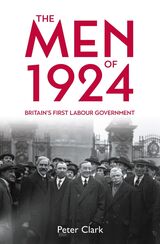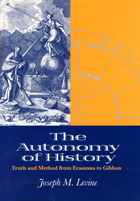
Levine's first three essays discuss Thomas More's preoccupation with the distinction between history and fiction; Erasmus's biblical criticism and the contribution of Renaissance philology to critical method; and the way in which Renaissance rhetoric, as in Thomas Elyot's Book of the Governor, continued to inhibit the autonomy of history. He then shows how these issues persisted into the eighteenth century, even as critical method developed. He concludes with a close description of the great controversy that culminated in Edward Gibbon's day over the authenticity of a biblical text that had been used for centuries to defend the Trinity but which turned out to be a forgery. Levine shows how by then all sides were ready to concede the autonomy of history.
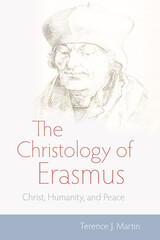

Erasmus and the Jews discusses Erasmus' critique of Mosaic law and his view of the conflict between "Judaism" as legalistic morality and Jesus' teaching; his judgment on the Pharisees of Jesus' time; his emphasis on the importance of the study of Hebrew; and his opinions of sixteenth-century Jews. This meticulous analysis reveals an Erasmus who defended his vision of true piety by rejecting "Judaizing" Christians more than Jews and who saw the Old Testament as integral to the Christian worldview. As a Christian, he regretted nonbelief and pitied unbelievers, without vicious hostility toward any single people. His theological opposition to a form of religious thought which he identified with Judaism was not translated into crude prejudice against actual Jews. In general, his calm consideration of the strange and the foreign and his willingness to restrict his judgments to the philosophical realm were, Markish argues, early and significant steps toward enlightened toleration.
Markish's discussion of Erasmus is supplemented with an Afterword by theologian and philosopher Arthur A. Cohen, who offers a variant interpretation of Erasmus' writings and attitudes. The juxtaposed arguments of the two scholars make this an especially illuminating work for any student of Erasmus and his influence. Erasmus and the Jews also gives a necessary clarity to our understanding of the meaning of anti-Semitism and the history of religious toleration. Markish's profound knowledge of Erasmus allows him to demonstrate the fundamental importance of putting arguments and terminology in the context of a thinker's work and his own time.
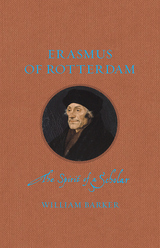
Erasmus of Rotterdam came from an obscure background but, through remarkable perseverance, skill, and independent vision, became a powerful and controversial intellectual figure in Europe in the early sixteenth century. He was known for his vigorous opposition to war, intolerance, and hypocrisy, and at the same time for irony and subtlety that could confuse his friends as well as his opponents. His ideas about language, society, scholarship, and religion influenced the rise of the Reformation and had a huge impact on the humanities, and that influence continues today. This book shows how an independent textual scholar was able, by the power of the printing press and his wits, to attain both fame and notoriety. Drawing on the immense wealth of recent scholarship devoted to Erasmus, Erasmus of Rotterdam is the first English-language popular biography of this crucial thinker in twenty years.
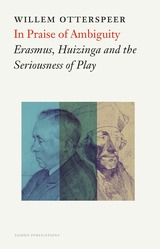
In Praise of Ambiguity presents a discourse about the seriousness of play. Erasmus and Huizinga are its main subjects, their books In Praise of Folly (1511) and Homo Ludens (1938) its main texts. Though published more than four hundred years apart, Otterspeer treats those books as contemporaries and asks what they still have to say to us. The main theme of both books is the contrast between two attitudes of life: the conviction that each subject has two or more sides as opposed to the certainty that there is always only one side to the subject. It is relativism versus essentialism, play versus seriousness.
In these times of populism and fundamentalism, the relationship between play and seriousness is more significant than ever. Erasmus and Huizinga conceive a compromise as brilliant as it is paradoxical: turn seriousness into play, play into seriousness. Their solution is the life blood of literature. Literature is always paradoxical, always "true" and "not true' at the same time, both reality and fiction. Ambiguity is its home territory. Literature is the best answer to the purity and peremptoriness of prophets.
READERS
Browse our collection.
PUBLISHERS
See BiblioVault's publisher services.
STUDENT SERVICES
Files for college accessibility offices.
UChicago Accessibility Resources
home | accessibility | search | about | contact us
BiblioVault ® 2001 - 2024
The University of Chicago Press




